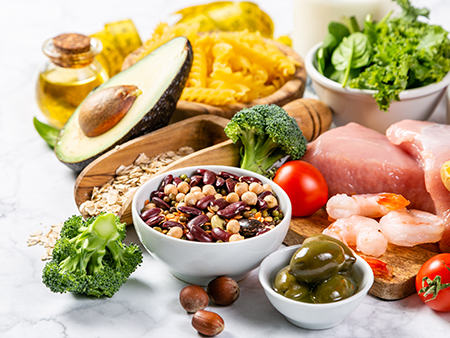Healthy Holiday Tips for People with Gout
 Frothy hot chocolate, roast turkey and buttery piesーthe most wonderful time of the year is upon us in all its abundance and decadence. It can be tempting to indulge during the holidays, but when you have gout those indulgences may be followed by a flare-up. Staying on track of your diet may be challenging during this time of year, but it’s not impossible!
Frothy hot chocolate, roast turkey and buttery piesーthe most wonderful time of the year is upon us in all its abundance and decadence. It can be tempting to indulge during the holidays, but when you have gout those indulgences may be followed by a flare-up. Staying on track of your diet may be challenging during this time of year, but it’s not impossible!
We recently sat down with Sharan Rai, Research Trainee at Arthritis Research Canada, and a PhD student in Nutritional Epidemiology at the Harvard T.H. Chan School of Public Health. Sharan’s area of study is on diet, gout and weight change which make her a great person to get some advice on how to stay healthy and get through the holiday season with ease.
The following are some tips and reminders to help you stay on track through the holidays, and for your everyday life.
Certain foods and drinks can trigger gout attacks, what are some foods to eat and others to avoid?
Diet is very important for gout. Dr. Hyon Choi, a Research Scientist at Arthritis Research Canada, has contributed substantially to this evidence. Certain foods have been found to be associated with higher uric acid level and gout risk, including alcohol (especially beer and spirits), meat, and seafood. Meanwhile, things like low-fat dairy, coffee, and vitamin C are associated with lower uric acid level and gout risk.
What is the DASH diet and how does it help gout patients?
DASH stands for Dietary Approaches to Stop Hypertension, and as you can tell by the name, it’s designed to promote heart health. The DASH diet encourages foods like fruits, vegetables, legumes, whole grains, and low fat dairy, and recommends limiting items like sodium, sweets, and red meat.
One of the studies I worked on found strong evidence that the DASH diet is associated with a lower risk of gout. Conversely, a ‘Western’ style dietーconsists of red meat, french fries and sweetsーis associated with a higher risk of gout.
Some general DASH diet recommendations include:
- Plenty of Fruits & Vegetables
- Whole grains such as whole-wheat, brown rice and quinoa instead of refined grains
- Include lean proteins such as fish, chicken, beans, and nuts
- Limit sodium intake
- Choose low-fat dairy products
- Avoid or limit saturated fats
- Limit intake of sweets and sugary drinks
What other advice do you have for preventing and managing gout?
In addition to eating healthy, it’s also important to maintain a healthy weight. Excess body weight can put you at a higher risk for gout.
The key thing to remember is that diet quality matters! Do your best to select high-quality foods, which are unrefined and minimally processed. Nourish your body with vegetables, fruits, whole grains, and healthy fats like olive oil.
Avoid highly processed and fried foodsーresearch has shown that it’s very easy for people to overeat these types of foods, which can lead to greater calorie intake and weight gain.
For people living with arthritis, is there such a thing as a “special arthritis diet?”
This is an area of research that has attracted a lot of interest. Although it’s outside of my area of expertise, I’ve seen some research examining the association of various diet patterns (eg. vegetarian, vegan, and gluten-free) with non-gout, inflammatory arthritis disease activity or incidence (most often among rheumatoid arthritis). However, the results are quite mixed.
There is substantial evidence for specific diet patterns that can improve overall health, such as the Mediterranean diet or the DASH diet. While, there may not be an “arthritis diet” just yet, people with arthritis can still improve their health by adhering to one of these established healthy diet patterns.
Check out Sharan’s recommended recipes
Finally, can you share with us what you’re currently working on?
It’s been a pleasure to be a Research Trainee at Arthritis Research Canada, as I work to find answers and improve the quality of life for people with gout.
For my PhD thesis, I’m exploring the relationship between plant-based diet components and gout risk, as well as weight change. Plant-based diets are an exciting area because they are beneficial for our overall health and environmentally sustainable. I am interested in which specific compounds within plants are helpful. Stay tuned for new updates from Arthritis Research Canada!




















































